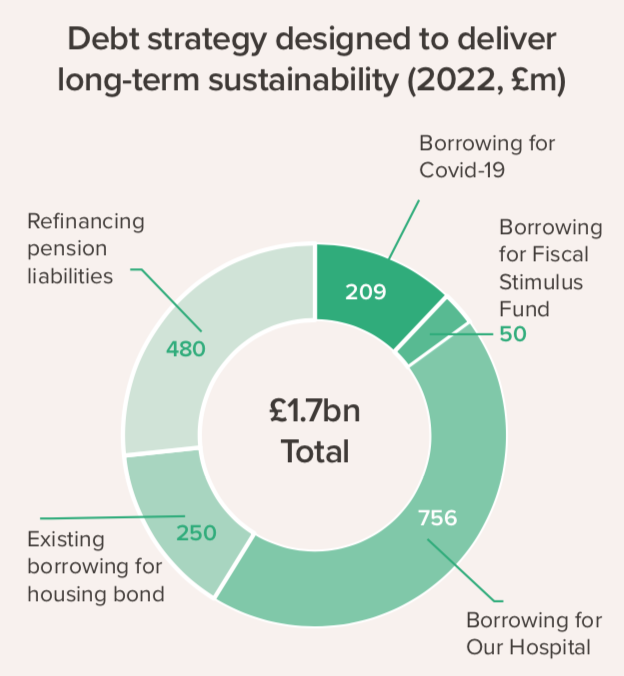


The colour of Jersey’s public finances will change from black to red if the Government’s next three-year spending plan is accepted – but Ministers maintain that borrowing is the best way meet its liabilities and pay for the new hospital.
The Government’s borrowing spree will leave the Island £1.8bn in debt and is a significant feature of the 2022-2025 Government Plan, which is published today.
Setting the debt ball rolling in 2014, when the Government took out a £250m social housing bond, its pace will quicken next year, when more loans are taken out for the new hospital, the covid response and to settle past pension liabilities.
However, Ministers maintain that borrowing against the £1bn in the 'Rainy Day Fund' - officially known as the Strategic Reserve - in this low-interest environment, and sticking to firm repayment plans, is not only the best way to keep the books balanced but will also save taxpayers billions of pounds over the long term.
Unlike the UK Government, which is raising National Insurance contributions to pay for social care, there will be no new taxes in Jersey next year.
However, fuel and tobacco duty will rise above inflation and – from 2023 – the threshold above which consumer pay GST on internet purchases will fall from £135 to £60.
The most popular online retailers such as Amazon will also charge GST at the point of sale rather than when the goods arrive at Customs, as happens now.

Pictured: Large online retailers like Amazon will charge GST at the point of sale on orders above £60 from 1 January 2023.
Overall, the Government expect to spend £85m more than they bring in next year, but return to a surplus in 2023 (£30m), maintaining an operating surplus thereafter.
Chief Minister John Le Fondré said: “From a financial perspective, we are also in a far better position than we first anticipated.
“Our reserves at the beginning of 2021 were just under £300m higher than at the end of 2019, even after all the measures we have taken in supporting Islanders through the pandemic. Our revenue forecasts are better for 2021, 2022 and onwards, and we have spent less on covid-19 than originally envisaged.
“Accordingly, we will return to balanced budgets sooner, during the period of this plan. This does not mean there will not be things we could have done better. Neither does it mean that there will not be further challenges ahead.
“But it does mean that we have got to this point in as good a position as could realistically have been the case.”
With £1bn sitting in the Rainy Day fund, the Government has been advised that it is better to borrow against this pot of money and use the interest payments from the fund to pay off the interest and capital of the debt.
The Government has already borrowed £250m, which it gave to Andium to expand and update the Island’s social housing stock.

Pictured: A breakdown of the debt.
At the beginning of next month, the States Assembly will decide whether the Government can borrow £756m to pay for the new hospital.
It has already been given permission to go overdrawn by £336m to meet the costs of dealing with covid.
And £50m has been also been drawn down for Fiscal Stimulus funding.
CLICK TO ENLARGE: A Government graph showing the options for funding the new hospital, including paying for it now out of the raining day fund.
That totals just under £1.4bn worth of borrowing, but that is not all. The Government has also decided to deal with a long ignored elephant in the room...
...a £328m pension liability from its pre-1987 States employees’ pension scheme.
CLICK TO ENLARGE: How the Government plans to tackle a £456m pension liability by borrowing £460m.
It also wants to clear the £128m liability in its pre-2007 teachers’ pension scheme.
This £456m total liability will be paid for by borrowing £480m, taking the debt total to £1.8bn.
However, the Government argue that now is the right time to go deeper into the red.
With regard to the £336m of potential covid debt, Ministers say the latest projections show that borrowing for covid will peak at £209m next year, compared to the £335m estimated in the last Government Plan.
As previously stated, they intend to meet this particular debt by using the £345m of taxes that will come in over the next 20 years from the 2019 tax year, which was frozen when islanders moved from paying on a previous year basis to current year.
It means that there will now be around £136m left over from the taxpayer transition that can be added to general revenues.
With regards to the new hospital, the Government says that using debt rather than reserves will save the taxpayer £1.7bn. This is because if it took out £756m out of the Strategic Reserve now, it would drop to £250,000 and would probably rebuild to £1.5bn by 2060.
CLICK TO ENLARGE: A Government guide on how the Strategic Reserve will grow if it performs as expected.
But if a bond is taken with a 1.75% interest rate, the reserve will have £4bn in it by 2060, a figure that takes into account the debt capital and interest repayments.
And even if the bond interest rate is 3.25%, the reserve will have more than £2.5bn in it by 2060, the Government argues.
It makes a similar argument for the pension liabilities. Paying off the liability now – rather than, in the case of the teachers’ fund, by 2115 – will save £3.6bn of taxpayers’ money, or £700m when you take inflation into account.
It expects to use existing budgets to pay the interest costs on this £460m loan and to set up a ‘sinking fund’ to eventually repay the borrowing.
Above all, the Government say that, apart from the new hospital – which at £804m is Jersey’s largest ever capital project – all borrowing replaces existing liabilities or reduces existing borrowing.
The total economic impact of covid is now expected to be £600m between 2020 and 2024.
This is made up of the £469m cost of tackling the virus, £81m of lost income (which is significantly lower that the £395m loss forecast for the period last year) and the £50m of fiscal stimulus funding.
The Government has based its assumptions both on the reality of 2021 so far but also the forecasts by economic soothsayers such as its Fiscal Policy Panel.
Its observations and predictions include:
CLICK TO ENLARGE: The economic outlook has improved, according to the Government's economic advisers, the Fiscal Policy Panel.
Treasury Minister Susie Pinel said: "While we are still feeling the effects of the pandemic across our community, this year’s Government Plan focuses on recovery and renewal for Islanders and our economy, by outlining a plan for the long-term sustainability of Government finances; thereby enabling us to build a better future together.
"We know that after six years of growth, our economy, like others across the globe, declined sharply in 2020 as many sectors had to close or run reduced services for periods of time.
"However, the latest forecast from the International Monetary Fund is for global growth of 6% this year. We are also planning for a strong recovery for Jersey."
Comments
Comments on this story express the views of the commentator only, not Bailiwick Publishing. We are unable to guarantee the accuracy of any of those comments.